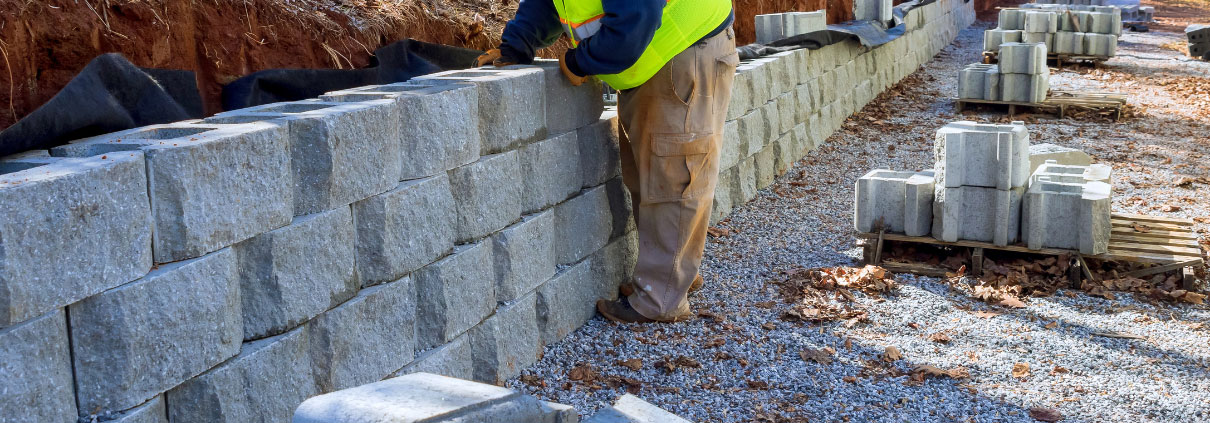
When it comes to landscaping projects, particularly those involving the construction of a retaining wall, selecting the right blocks is crucial for both the aesthetic and structural integrity of your outdoor space. Retaining wallsRetaining walls are structures designed to hold back soil and prevent erosion in landscapes with var... serve multiple purposes, from preventing soil erosion to creating visually appealing garden tiers.
This buyer's guide will navigate you through the process of choosing the perfect retaining blocks for your project, ensuring durability, aesthetic appeal, and functionality. Explore how expert hardscape contractors can help you!
Retaining walls are structurally designed barriers used in landscaping and construction to hold back soil and prevent erosion. These walls are essential in managing sloped terrains, where they provide stability to the landscape by preventing the downward movement of soil due to gravity and other forces.
Beyond their functional purpose, retaining walls also offer aesthetic benefits, allowing for the creative shaping of outdoor spaces into terraced areas, garden bedsGarden beds are designated areas within a landscape where plants, flowers, and shrubs are cultivated..., and more.
The primary function of a retaining wall is to combat soil erosion and manage water runoff, making them crucial for properties situated on uneven or sloped terrain. They are used to create levelA level is a tool used to determine whether a surface is horizontal (level) or vertical (plumb). It ... areas in a yard, support garden beds, prevent damage to structures, and enhance usable outdoor space. Retaining walls also serve to protect buildings and roadways from the pressures of earth movement and water accumulation.
Retaining walls play a crucial role in landscaping, not only in terms of functionality by preventing soil erosion and managing water flow but also in enhancing the aesthetic appeal of outdoor spaces. Understanding the different types of retaining walls and the materials available for their construction can help you make informed decisions that best suit your project's needs.
These walls rely on the sheer mass of their construction materials to hold back the soil. Typically shorter in height, gravity walls are often built using heavy materials such as concreteConcrete is a composite material made from a mixture of cement, sand, gravel, and water. It is one o... blocks or natural stone. The simplicity in their design allows for flexibility in aesthetic choices, making them a popular option for garden walls where visual appeal is as important as functionality.
Distinguished by their L-shaped design, cantilevered walls are engineered to distribute the lateral pressure from the soil down to the base, where it is spread out evenly across the ground. This design allows for taller and stronger walls without the need for as much material. Concrete is a common choice for cantilevered walls due to its strength and ability to be molded into the necessary shape.
Ideal for areas with soft soil, limited space, or where water frontage is present, sheet piling walls are constructed by driving thin, interlocking sheets of steelSteel is a strong, durable alloy made primarily of iron and carbon, commonly used in construction an..., vinyl, or woodWood is a natural, organic material derived from trees, commonly used in landscaping and constructio... deep into the soil. The depth they are driven to provides the necessary support to retain the soil, making them an effective solution in challenging conditions.
Offering the highest degree of support, anchored retaining walls are suitable for projects requiring the retention of large amounts of soil. These walls use cables or rods anchored into the soil or rock behind the wall, which are then connected to the wall itself. This method provides additional support, making it possible to construct taller retaining walls with less material.
When selecting materials for a retaining wall, consider the specific requirements of your project, including the type of wall, the height, the soil conditions, and your aesthetic preferences.
Known for their versatility, concrete blocks are manufactured in various shapes, sizes, and textures, allowing for a wide range of design possibilities. They are especially suited for gravity and cantilevered walls, where their strength and ease of installation are beneficial. Concrete blocks are also a cost-effective choice for both small and large projects.
Natural stone blocks bring a unique and timeless beauty to any project. Each stone is unique, providing a variety of colors and textures to choose from. While natural stone can be more expensive and require more skill to install properly, the end result is often worth the investment, particularly for projects where aesthetic appeal is a priority.
Timber offers a warm and natural look that is hard to replicate with other materials. It is best suited for smaller retaining walls or garden beds where the interaction with moisture is limited to extend its lifespan. Despite its susceptibility to rot and insect damage, timber can be treated to resist these issues for a time, making it a viable option for certain projects.
Choosing the right type of wall and material for your retaining wall is crucial for ensuring its longevity, stability, and visual appeal. Working with a professional hardscape contractor can provide you with the expertise necessary to make the best choice for your specific situation.
Choosing the right retaining blocks is just the first step in transforming your landscape. At West Hills Masonry, our team of skilled hardscape contractors is ready to bring your vision to life. From selecting the perfect materials to ensuring proper installation and drainage, we handle every aspect of your retaining wall project. Contact West Hills Masonry today to start creating a beautiful and functional outdoor space that stands the test of time.
 Carlos Gonzales
Carlos GonzalesLocations We Serve
Schedule A Consultation